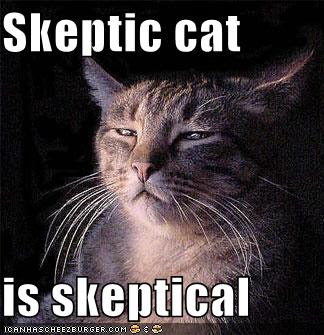
A debate within the atheist/skeptic community that has been silently brewing for a long time now has finally been brought right out into the open. Every year, the largest gathering of skeptics and critical thinkers in the world go to Vegas to what they call The Amazing Meeting, named after James Randi's stage name, The Amazing Randi. This year, the keynote speech was given by Phil Plait, the founder of BadAstronomy.com.
Plait's message to his fellow skeptics was this: stop being dicks. He's taken note of how terribly the skeptic community can treat other people, often throwing insults or scoring cheap points instead of trying to sway them. The general public is going through enough without us insulting them: we are telling them that their magical world is a sham, that psychic powers and their new age bullshit is not real, that there is no afterlife, that the Judeo-Christian God does not exist; and these are things that people would really rather not hear. In addition, society at large has painted anybody who's skeptical of anything at all as spiteful or emotionally dead, and so people usually dismiss what we have to say before we even say it. People have a hard time understanding exactly what skepticism is, and simply view it as cynicism rather than a passion for truth. In Plait's own words, skepticism is a hard sell.
Plait believes we need to look at our ultimate goal -- getting the world to think reasonably -- and examine the best ways of accomplishing it. Instead of calmly debunking every claim one by one, over and over again, we should instead be encouraging people to think critically for themselves, so we can stop treating them like their hands need to be held. That old saying about teaching a man to fish is the perfect metaphor for this. If people know how to think -- by not accepting things outright before demanding a good reason to -- our job will already be done because reason will come to them naturally. They will already have all the tools in their head.
It was a really brilliant speech, and the full half hour is right here if you have the time to spare.
Phil Plait - Don't Be A Dick from JREF on Vimeo.
The skeptic community is divided. Calling it a "community" is a bit generous, because when we're so few, internet blogs and youtube videos are the only things we have going for us. And there are actually a lot of big blogs discussing this, as Plait illustrated himself in his... blog. The voices against this are either motivated by mental masturbation, or simply don't understand what Plait was trying to say, so I won't comment on those morons any further.
Plait made another entry describing the positive reaction he got, and this passage alone is why we need to be doing this.
As we left the auditorium and went out into the hall, someone beckoned to me. I went over, and they told me that an old friend wanted very much to talk to me. Down the corridor I saw Kitty, indeed an old friend and someone very active in the skeptical community in general and the JREF community specifically. As I approached her, to my distress, I saw she had been crying. Concerned, I rapidly went to her, and over the next few minutes, between sobs, she told me how much my talk meant to her. She is religious, in a rather generic way (you could call her a deist, someone who believes in a non-specific god) and over the years has received quite a bit of ostracism from the community. This, despite her long and strong support for speaking up against psychics, ghost hunters, UFO believers, alt-meddlers, and the rest.
She was crying because what I said was something she had longed to hear from someone, anyone, in the skeptic community for years: that we need to be less antagonistic, and more inclusive. When we exclude someone for one belief they may have, we are losing them despite whatever other skeptical drive they might possess. And that means we all lose.
She was not alone, either. Another young woman, one I had never met before, similarly approached me and told me much the same story. She was crying as well. Eventually I heard from others who told me there were several people in the audience who were crying because they had felt so alone. Many were feeling so isolated from the skeptical community — and had experienced so many encounters with other skeptics who were rude, boorish, insulting, and dismissive — that they were seriously considering leaving the movement altogether.
I also heard from hundreds — hundreds — of people thanking me for what I said. They had seen others be jerks, or had been jerks themselves, and were contrite about it.
The support I have received has been very encouraging. The drop in the level of demeanor I had been seeing was disheartening to say the least. I’m very glad to know that so many people took this topic to heart.
And, at the very least, it has helped spark a conversation that, in my opinion, is long overdue in the skeptic community. We need to be skeptical of ourselves as much as we are of any claims made by others, and we should be reminded of that every now and again.
I try to send this video to every person I know who's confused about what skeptics do, or why we think the way we do. To this day I still don't think anyone I've sent it to has bothered watching it past a couple minutes.


I've never watched that all the way through, because the man's voice is quite boring if I do say so myself.
ReplyDeleteAlthough, I did watch it all just then :)
http://sphotos.ak.fbcdn.net/photos-ak-snc1/v350/23/115/54301437/n54301437_30594246_7696.jpg
ReplyDelete